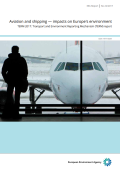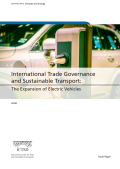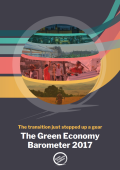This policy brief, Disruptive Innovation and Win-Win Strategies for the Sharing Mobility Economy, published as part of the Green-Win project provides insights into the disruptive innovation of the sharing economy which is occurring in the urban mobility sector. Sharing mobility promotes win-win strategies that aim to provide short-term socioeconomic benefits and longer-term environmental impacts through mitigation and adaptation gains and therefore to enhance sustainable development in cities. Disruptive innovations, like mobile apps can coordinate on-demand vehicle and ride sharing at unprecedented scales, transforming urban mobility. Although social and technological sharing innovations may address multiple urban problems, there is an ‘adaptive lag’ in governance which is fostering new environmental problems. A collaborative governance regime to support win-win sustainability strategies in the shared mobility sector is needed between mobility companies, users and the public, and city governments. The analysis is illustrated through examples investigated in the Green-Win project.



The report Transport in Nationally Determined Contributions (NDCs) summarises case study findings from rapidly-motorising countries, including Bangladesh, Colombia, Georgia, Kenya, Nigeria, Peru and Viet Nam. It highlights the shared challenges they face in developing and delivering greenhouse gas mitigation actions within expanding transport sectors. These include the impact that a lack of transport data is having on sectoral climate action and the need for increased buy-in from key transport stakeholders to achieve countries’ climate change commitments. The report also highlights the need to build climate change expertise within transport authorities, and for greater alignment between NDCs and national transport sector strategies.

Every year, the Green Economy Coalition publishes the Green Economy Barometer, an analysis of the state of the global movement towards a fair, sustainable future. The Barometer tracks the transition, both celebrating the successes, and calling attention to challenges yet to be overcome. It contains key stats, facts, and highlights from the year 2017, and it casts an eye ahead to what the next twelve months have in store.
The Green Economy Barometer 2017 argues that the light on the global green economy horizon has brightened this year: markets are booming; new narratives are emerging; investment is flowing. Tipping points in energy, transport, and global leadership may well be arriving. But that same story looks different from the ground: young people need jobs; biodiversity is in crisis; and rural economies are being left behind.
